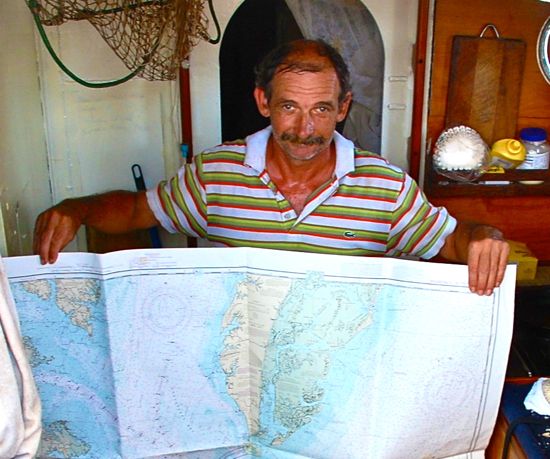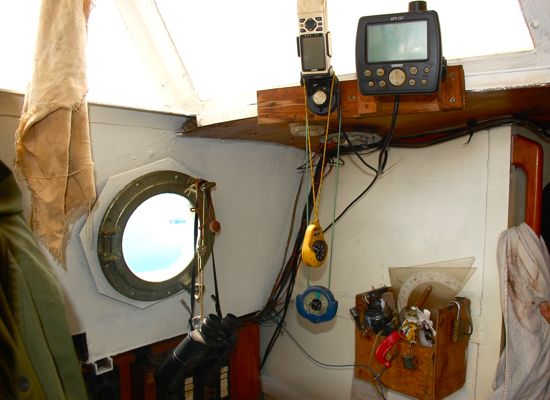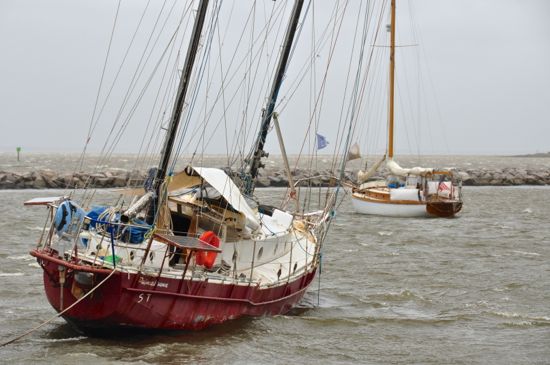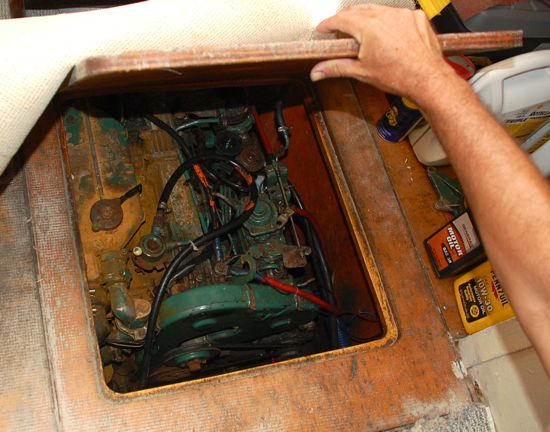It's Thursday February 19, 2026

Lots of boats come to Oriental, some tie up at the Town Dock for a night or two, others drop anchor in the harbor for a while. If you've spent any time on the water you know that every boat has a story. The Shipping News on TownDock.net brings you the stories of the boats that have visited recently.
July 24, 2013
If a naval vessel hadn’t given “Primadonna”‘s crew a chart of Norfolk and a few gallons of diesel, she wouldn’t be anchored in Oriental – or involved in a local controversy. The red steel vessel has been moored in the public anchorage longer than most visiting boats. This has put her crew at odds with some Oriental residents and visiting boaters.One crew member even had to appear in Pamlico County municipal court after having been arrested for shoplifting at a local grocery store.
Sailing aboard Primadonna are Pascal Ott and Monique Christmann. The couple and their vessel are facing increasing pressure to leave Oriental. Pascal say all that’s keeping their steel sailboat in town is 10 gallons of diesel, a starter motor and “twenty dollars’ worth of sailing twine”.
With that, he says, they could sail home to France.
 Primadonna. Living aboard are Pascal Ott and Monique Christmann. For months, the french steel ketch has occupied the same spot in the Oriental anchorage.
Primadonna. Living aboard are Pascal Ott and Monique Christmann. For months, the french steel ketch has occupied the same spot in the Oriental anchorage. Pascal with the blade of his Aries wind vane – minus a chunk out of its tip. The Aries steering gear uses the wind to keep Primadonna on course under sail. The blade – which is deployed in the water when the vane is in use – was attacked by large shark.
Pascal with the blade of his Aries wind vane – minus a chunk out of its tip. The Aries steering gear uses the wind to keep Primadonna on course under sail. The blade – which is deployed in the water when the vane is in use – was attacked by large shark. Monique Christmann, Pascal’s sailing partner. She enjoys traveling aboard Primadonna but finds Pascal’s other boat – which is in Sète, France – smaller and easier to handle. Sète is Primadonna’s home port.
Monique Christmann, Pascal’s sailing partner. She enjoys traveling aboard Primadonna but finds Pascal’s other boat – which is in Sète, France – smaller and easier to handle. Sète is Primadonna’s home port.( Publisher’s note: The following story… is Pascal’s story. Pascal’s account may not mesh with published Coast Guard reports. According to a passport stamp, the date of his arrival in Norfolk was in September, one month before Hurricane Sandy. )
It started with a storm. Pascal says late 2012 found Primadonna sailing up the Atlantic seaboard, off the coast of North Carolina and Virginia. She was on her latest passage on a voyage that had begun in her homeport of Sète, France, and stretched to Africa and St Martin. From the Caribbean, she had visited Bermuda and was now sailing for New York.
One day, the wind rose and the seas grew high. Very high. Pascal says the storm struck him as being stronger than usual. Then he heard a distress call. It was the “Bounty”, the replica of the British sailing vessel of the same name. She was sinking.
Primadonna was being overtaken by Hurricane Sandy.
Over the radio, he heard a rescue operation was in progress. Pascal calculated the sinking vessel’s position. It was close by. Near enough, he says, that he was ready to render assistance.
 Pascal says this was Primadonna’s position during her encounter with Hurricane Sandy and the Bounty.
Pascal says this was Primadonna’s position during her encounter with Hurricane Sandy and the Bounty.A helicopter approached Primadonna. Pascal offered to help with the rescue. He was told that, no, his assistance was not needed. So Pascal carried on, managing his vessel as best he could in conditions that had sunk the much larger vessel.
That night, Pascal says, over the stormy seas, he saw something unusual. He called the rescue operation. Told them, “I see a bright red light in the sky.” He says rescuers didn’t take him seriously. He says he repeated what he was seeing, adding, “I know dolphin don’t play with fireworks. I know fish don’t play with fireworks.”
He guessed he was seeing flares set off by the crew of the Bounty.
He says the next day the Coast Guard returned to the area and picked up additional crew members found in the water.
The day after Primadonna weathered the hurricane, the wind died. Vessel and crew were becalmed at sea. Pascal says in advance of the Hurricane Sandy, the Navy had sent much of its fleet to sea. Now, they were all around him. There were so many ships surrounding him, he say it looked like a “naval maneuver”.
Pascal was contacted by one of the vessels. They told him he had to leave the area.
He told them he could not. There was no wind.
They told him to start his engine.
He countered he did not have enough fuel to make it to shore. Or a chart to make the nearest harbor – Norfolk.
He was, after all, New York bound.
In the end, the military filled his tank with diesel and gave him a chart of Norfolk.
 The navigational chart Pascal says he was given.
The navigational chart Pascal says he was given.Pascal started his engine and arrived two days later in Norfolk. He tied up to a pier and cleared in with Customs and Immigration. Then, Pascal says he made his way down the East Coast. In the autumn of 2012 he arrived in Oriental.
[page]
That Primadonna survived this long at sea may have something to do with her design. She is the third hull built to Jean Knocker’s “Joshua” design. French sailor Bernard Moitessier sailed the original Joshua to fame in the 1968/69 Sunday Times Golden Globe Race.
The Golden Globe Race was a race for solo sailors. The prize would go to the first sailor to sail alone – non-stop and un-assisted – around the world. After rounding Cape Horn and sailing around much of the world – with a good chance of winning the contest – Moitessier abandoned the event. He sailed on to Tahiti, earning, instead of the £5,000 prize and the Golden Globe Trophy, the admiration of sailors and philosophers. He covered over 37,000 miles in 10 months.
Primadonna has logged more sea miles than Moitessier’s vessel sailed in the Golden Globe Race.
Built in the early 1970s – in the same yard where Moitessier’s boat was built – her first owner sailed her around the world via Cape Horn. Twice. Pascal has owned her 5 years.
Her steel hull is built for the rigors of the Southern Ocean, for the latitudes known as the Roaring Forties and Furious Fifties. Her deck beams are extra thick steel. Her hull is welded together ship-lap style. That is, the seams overlap, making for an extra rigid structure.
Like all boats, though, time and the sea have taken their toll. During his stay in Oriental, Pascal wanted to work on Primadonna. Mend the sails. Repair the starter motor. Fill up the fuel tanks. Then sail home to France.
It hasn’t happened.
 On deck looking aft. Off the stern, the Oriental Yacht Club dock and shelter.
On deck looking aft. Off the stern, the Oriental Yacht Club dock and shelter. The Joshua design – on which Primadonna is based – has a reputation for strength. According to Pascal, Primadonna once collided with a steel shipping container. The impact broke the bob stay – the steel strut that connects the end of the bowsprit to the hull. Unsupported, the bowsprit jutted skyward, putting the mast in peril. Pascal made repairs as best he could and the temporary fix saw him to port. Last year, in St Kitts, he made the repair more permanent. He had an excavator put its shovel on the bent bowsprit – then pressed it down – and back in to place. The bent section of steel tubing is wrapped in line.
The Joshua design – on which Primadonna is based – has a reputation for strength. According to Pascal, Primadonna once collided with a steel shipping container. The impact broke the bob stay – the steel strut that connects the end of the bowsprit to the hull. Unsupported, the bowsprit jutted skyward, putting the mast in peril. Pascal made repairs as best he could and the temporary fix saw him to port. Last year, in St Kitts, he made the repair more permanent. He had an excavator put its shovel on the bent bowsprit – then pressed it down – and back in to place. The bent section of steel tubing is wrapped in line. Primadonna’s boom is heavily built for offshore sailing. This has consequences. Pascal says, “A boom, if they hit your head, you fly overboard. If this one hits your head, it’s your head that will fly out. You will stay here.”
Primadonna’s boom is heavily built for offshore sailing. This has consequences. Pascal says, “A boom, if they hit your head, you fly overboard. If this one hits your head, it’s your head that will fly out. You will stay here.” The forward cabin serves as the main living area. Separated from the galley and nav area by a watertight bulkhead, it is equipped with a table, berths and storage compartments.
The forward cabin serves as the main living area. Separated from the galley and nav area by a watertight bulkhead, it is equipped with a table, berths and storage compartments. The bow serves as sleeping quarters. In front of the forward bulkhead, a compartment for anchoring gear.
The bow serves as sleeping quarters. In front of the forward bulkhead, a compartment for anchoring gear. The navigation station. Pascal plots his course with paper charts, divider and rule.
The navigation station. Pascal plots his course with paper charts, divider and rule. Above the chart table, GPS, compass and binoculars.
Above the chart table, GPS, compass and binoculars. Pascal says he and Monique shower and use the facilities at the home of friends they’ve made in town. By law, vessels aren’t allowed to pump unprocessed sewage overboard. Marine heads, if installed, must be connected to a holding tank. Pascal says Primadonna’s head is connected…
Pascal says he and Monique shower and use the facilities at the home of friends they’ve made in town. By law, vessels aren’t allowed to pump unprocessed sewage overboard. Marine heads, if installed, must be connected to a holding tank. Pascal says Primadonna’s head is connected… …to this plastic holding tank under the head compartment sole.
…to this plastic holding tank under the head compartment sole. While visiting Oriental, Primadonna’s crew picked up a non-standard piece of cruising gear. They adopted Maddy, the canine first mate.
While visiting Oriental, Primadonna’s crew picked up a non-standard piece of cruising gear. They adopted Maddy, the canine first mate.[page]
Primadonna has been anchored in Oriental’s anchorage for nine months. This has lead to considerable friction between Primadonna’s crew and visiting boaters, residents and merchants.
While Oriental has a clear policy on how long a vessel can visit the Town Dock (48 hours, per month), how long a vessel can stay in the anchorage is less clear. At present, the town relies on visiting cruisers to self-police the length of their stays. Most spend a few nights or weeks in the anchorage, for which there is no charge. Occasionally, some stay a month or more before moving on to another anchorage or a marina.
This honor system gives visiting boaters a shot at finding a place in the anchorage. It also means that – so far – the anchorage is unregulated by time limits.
Some municipalities, citing yachts that overstay their welcome, have imposed time limits on how long visiting boaters can stay. It varies from a few hours to a few days. After that, the boats must move on.
While in Oriental, Primadonna’s lengthy stay – along with that of two other long-time visitors to the anchorage – has raised the issue of how to deal with boats that overstay their welcome.
 Primadonna has not been alone in overstaying what some see as a reasonable amount of time. The boats are – Primadonna (red), Southern Cross (off-white), The Shire, (pink). Some visiting boats say the presence of the long-term anchored boats means they are bypassing Oriental.
Primadonna has not been alone in overstaying what some see as a reasonable amount of time. The boats are – Primadonna (red), Southern Cross (off-white), The Shire, (pink). Some visiting boats say the presence of the long-term anchored boats means they are bypassing Oriental. Last year, in late November, Primadonna stayed at the Town Dock many days past the 2-day limit. Only after receiving a visit by Police Captain Dwaine Moore did she return to the anchorage.
Last year, in late November, Primadonna stayed at the Town Dock many days past the 2-day limit. Only after receiving a visit by Police Captain Dwaine Moore did she return to the anchorage.Pascal says he has run out of money.
He relies on a pension for income. He says, “usually I get my retirement in France. But since 4 months, with the new president, they don’t pay my retirement… They say, ‘we lose the paper.’” Pascal claims he has tried to contact French authorities, but got nowhere.
All the while, while he was trying to sort his finances, he kept Primadonna in the anchorage. Moving her to a marina, Pascal says, was too expensive.
This struck a nerve with some locals and visiting boaters. It was felt Primadonna (and two other boats) were overstaying their welcome – preventing visiting boaters from using the anchorage. In early June, these thoughts appeared in the Letters to the Editor section of TownDock.net. A month later, with the same three vessels still occupying the anchorage, there were more Letters to the Editor regarding the anchorage.
There were also concerns about how securely – or insecurely – the vessel’s anchors were keeping the heavy steel sailboat in place. Once, while anchored in Oriental’s outer anchorage, winter winds caused the vessel to drag toward the Oriental bridge. She was eventually secured to the Oriental Harbor Marina’s outside dock.
Pascal later moved her to the more sheltered inner anchorage, where she’s resided ever since. During a hard June blow, when water levels fell, she was left hard aground.
 Primadonna heeled over on bottom as low waters, brought on by high June winds, beset the harbor. In another blow last winter, she broke free and bore down on the Oriental bridge before a line was tossed from the face dock at Oriental Harbor Marina.
Primadonna heeled over on bottom as low waters, brought on by high June winds, beset the harbor. In another blow last winter, she broke free and bore down on the Oriental bridge before a line was tossed from the face dock at Oriental Harbor Marina.Pascal says now, anchored with two anchors, one fore, one aft, she is more secure. With her 2 meter draft, the only place deep enough to hold her is close to the main channel leading in to the Town Dock. He says when the wind blows her in to the channel that leads to town – where she might be a hazard to one of the many private and commercial vessels that uses the channel – he uses the wind and stay sail on her bow to push her out of the way.
 Primadonna moored in Oriental’s inner anchorage. The green buoy marks the stern anchor. It’s supposed to keep the vessel from swinging in to the busy channel that leads to the Town Dock.
Primadonna moored in Oriental’s inner anchorage. The green buoy marks the stern anchor. It’s supposed to keep the vessel from swinging in to the busy channel that leads to the Town Dock.Monique knows the length of Primadonna’s stay has irritated some people. She says people ask her, “When are you leaving? When are you going?”
Primadonna’s crew acknowledges Oriental has been generous. Pascal says residents have made cash donations of varying amounts. Churches such as Saint Peter the Fisherman have given Monique food. Out of town visitors have given cash and food.
All of which wasn’t enough. On May 29, Monique was arrested for shoplifting.
[page]
The longer Primadonna stayed in the town, the more complaints Police Captain Dwaine Moore says he received regarding her crew. While it was an open story that Pascal and Monique needed money, it bothered many people, including some merchants, how they went about their fund-raising.
Monique, reports Police Captain Moore, loitered outside their premises and asked customers for money.
On May 29, Moore was contacted by the Town and Country grocery, where an employee reported they had witnessed Monique shoplifting.
Captain Moore says that Monique appeared in the store that morning, as she often had before, and made her purchase – a loaf of Sunbeam Queen thin sliced bread. When Moore approached her, he also found in her possession a jar of Nutella and a can of coffee, neither of which had been paid for.
 The shoplifted items – a can of coffee and a jar of Nutella. Together, the items were valued at less than ten dollars. The theft puzzles Moore. Though she claims she was hungry, he notes that area churches have provided Monique and Pascal with food for months. He says that some churches have cut back on their offerings because they felt Monique and Pascal were taking advantage of their largesse. (Dwaine Moore photo)
The shoplifted items – a can of coffee and a jar of Nutella. Together, the items were valued at less than ten dollars. The theft puzzles Moore. Though she claims she was hungry, he notes that area churches have provided Monique and Pascal with food for months. He says that some churches have cut back on their offerings because they felt Monique and Pascal were taking advantage of their largesse. (Dwaine Moore photo)Monique was charged with shoplifting. Specifically, NC General Statute 14-72 1(a) which concerns “possessing goods represented as stolen.” The police report indicates she, “Without authority did conceal 1 jar of Nutella spread and one can of coffee the merchandise of the Town and Country grocery store, while still upon premises.”
On June 14, Monique appeared in municipal court in Bayboro.
Monique speaks French and some English. Assistant District Attorney Laura Bell, assisted by online translation software, explained the charges. Monique indicated she understood and pleaded guilty to shoplifting. She says she took the items because she was hungry and had no money.
Moore says he and Bell took Monique’s case in to consideration. She had no prior convictions and her overseas records were unavailable. Moore explains that, in the end, “the charge was dismissed on the basis of what the acting agent negotiated with the Town and Country Grocery store and the assistant D.A.”
Specifically, the Town and Country Grocery would drop the charges and Monique would be banned from the property.
[page]
While there are no hard and fast rules on how long French citizens can visit the US, there are some procedural steps that must be adhered to. When entering the US – whether by land, sea or air – visitors must check in with US Customs and Immigrations. Passports are inspected and often stamped. If stamped, the stamp indicates the port of entry and date entered. It also mandates the date by which a visitor must depart (or extend their stay with the proper authorities).
For many travelers, the passport serves as primary source of identification.
Moore says that when a person is charged by law enforcement – for shoplifting or any other suspected illegal activity – positive identification must be established. In Monique’s case, to establish her legal name, she used her passport.
Upon inspection, it was found that Monique entered the US in Norfolk, Virginia on September 14, 2012. A stamp in her passport indicated by which date she must depart – March 13, 2013. By her court date, June 14, 2013, she should have already been out of the country for over 3 months.
 The stamp in Monique’s passport showing entry (September, 14, 2012) and exit (March 13, 2013) date. It is unclear whether she – or Pascal – have applied for an extension. The “B2” indicates the visit was for the purpose of pleasure or tourism. (Dwaine Moore photo)
The stamp in Monique’s passport showing entry (September, 14, 2012) and exit (March 13, 2013) date. It is unclear whether she – or Pascal – have applied for an extension. The “B2” indicates the visit was for the purpose of pleasure or tourism. (Dwaine Moore photo)Police Captain Moore is in contact with ICE (US Customs and Immigration Enforcement) regarding Monique’s status. He notes that if taken in to custody again, she will be subject to deportation.
And so Primadonna and crew linger in Oriental’s anchorage. Moore says that Oriental is a generous town – especially to visiting boaters that might have need of repairs. In the past, citizens have often assisted boats with repairs and donations of cash and time. Primadonna, when she first showed up, appeared to be next in the long line of boaters who’ve taken a breather here. Patched up their sails. Topped up their cruising kitty. Then moved on.
It frustrates people that, 8 months after they showed up, Primadonna’s crew shows no sign of making progress – despite the assistance Oriental citizens have extended.
Back on Primadonna, Pascal knows hurricane season is approaching. He says he still has no money. He does, however, have a list of what he needs and what it will cost – sailing twine (twenty dollars), a starter for his engine (two hundred dollars) and 10 gallons of diesel (fifty dollars).
He says the starter motor for his engine is being serviced in New Bern. The trouble seems to be mechanical (if it were electrical, he says he could probably fix it himself). He might have a contact in California that would pay for the repair. The sailing twine is available locally. As is the diesel.
 Two of the three things Pascal needs go in this compartment. Here, the Volvo engine which resides under the cabin sole. The engine works. It just needs a starter. And a few gallons of diesel…
Two of the three things Pascal needs go in this compartment. Here, the Volvo engine which resides under the cabin sole. The engine works. It just needs a starter. And a few gallons of diesel…With those supplies, he says, he could to proceed to Morehead City and sail out in to the Atlantic Ocean. From there he should be fine. “If I am on the sea, I don’t care… On the other side, I will find a French military (ship). I used to be in the Navy. I will find a boat there and fill up.”
And if he doesn’t get what he needs in the two or three weeks before hurricane season arrives? Pascal says, “If I don’t have a solution, then I will sit here another year….. I won’t drive out into a hurricane.”
Listen to Pascal – he says a few gallons of diesel would help Primadonna leave the anchorage:
Primadonna remains in the Oriental anchorage.
